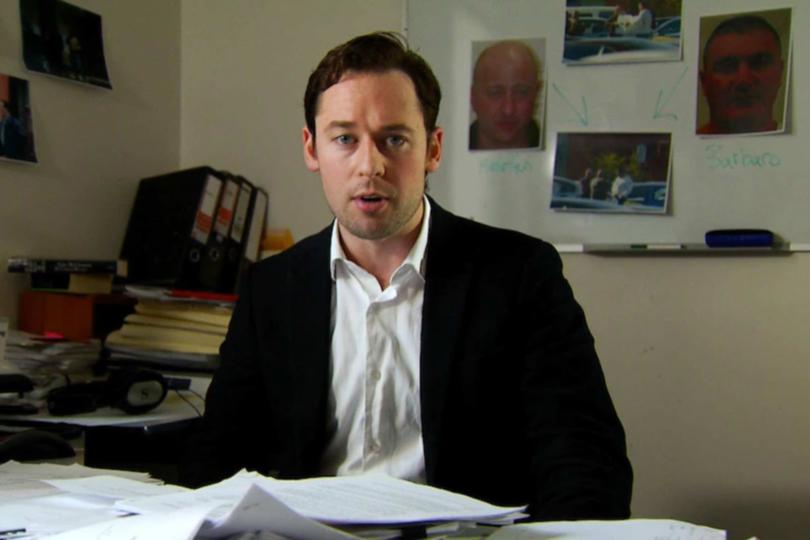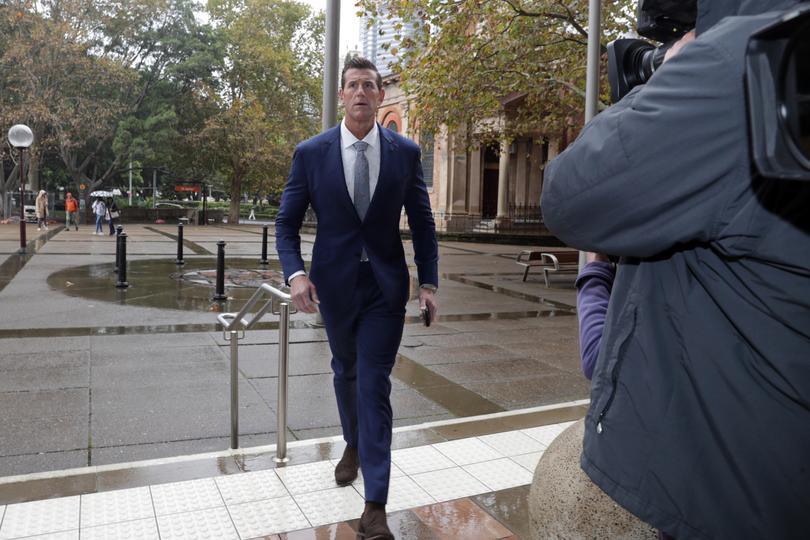Leading Nine reporter Nick McKenzie, who took down SAS soldier Ben Roberts-Smith, defends ethics in court
The investigative journalist who pursued former SAS soldier Ben Roberts-Smith over war crimes allegations, Nick McKenzie, admitted in court that he would break the law to get information.
The investigative journalist who successfully pursued former SAS soldier Ben Roberts-Smith over war crimes allegations, Nick McKenzie, admitted in court that he would break the law to get information.
In a court case that may determine if the Victoria Cross winner is able to clear his name, Mr McKenzie was forced to defend his professional ethics under hostile questioning from one of the Australia’s top barristers, Arthur Moses, SC.
“I try to act within the law,” the writer for Melbourne’s Age newspaper told the Federal Court on Thursday. “There is occasion where as a journalist there can be things that you might do that conflict with the law.”
Sign up to The Nightly's newsletters.
Get the first look at the digital newspaper, curated daily stories and breaking headlines delivered to your inbox.
By continuing you agree to our Terms and Privacy Policy.Mr Roberts-Smith, who was in court, is trying to use new evidence to overturn a 2023 finding in what became known as “the defamation case of the century” that he executed prisoners in Afghanistan.
The ex-soldier’s lawyers argue a recording in which Mr McKenzie states he “breached my f---ing ethics” shows the journalist obtained Mr Roberts-Smith’s confidential legal documents and used them in the case.
In the witness box
Because most of Thursday’s hearing was about whether the recording and other information could be used, Mr McKenzie was only questioned by Mr Moses for about an hour.
He will return to the witness box on Friday, when the barrister is expected to play the recording and ask Mr McKenzie to explain what he meant when he told a former girlfriend of Mr Roberts-Smith’s: “You know the fact they’ve actively, like, briefing us on his legal strategy in respect of you.”

Much of the questioning focused on a 2008 court case in which Mr McKenzie was charged by the federal government with accessing a database operated by the Labor Party.
Despite reaching an agreement with prosecutors that required him to make a public statement acknowledging he and others needed “to ensure that our methods are lawful”, Mr McKenzie denied he had “crossed the line” as a reporter.
“Was I acting unethically?” Mr McKenzie said. “I didn’t think so.”
Walkley Awards
Since then, Mr McKenzie has emerged as one of Australia’s leading investigative journalists. He has won 16 Walkley Awards, a prize overseen by an arm of the journalists’ union, and regularly appears on the 60 Minutes program.
His successful seven-year legal fight with Mr Roberts-Smith, a former employee of Seven West Media, was the pinnacle of his career which he turned into a book, “Crossing the Line, The Inside Story of Murder, Lies and a Fallen Hero”.
A passage was quoted by Mr Moses on Thursday to show how badly Mr McKenzie, who began training as a lawyer during the case, felt he needed to win.
“You had your balls in a vice because you believe your career would be over if you lost your case?” Mr Moses asked.
“I do recall writing that in my book,” he answered.
A few minutes later, Mr McKenzie said: “Through the whole proceeding I was really anxious to prove that Ben Roberts-Smith was a war criminal and we had to find evidence to do that.”

No code
One of the important witnesses against Mr Roberts-Smith in the original case was his estranged wife, Emma Roberts, who Mr Moses said accessed her husband’s email account 101 times in 2020 and 2021, when he and McKenzie were in court.
Mr McKenzie’s legal team recently provided their opponents three recordings of conversations between Mr McKenzie and a confidant of Ms Roberts’, Danielle Scott.
The recordings were not played in court and the circumstances in which they were taken is unclear. But Mr Moses pointed out an editorial code of conduct at Nine Entertainment Co, which were McKenzie works, requires journalists to keep records of interviews for 12 months.
Mr McKenzie said he had not read the code.
‘Blackmail or coercion’
Before the journalist took the stand, much of the courtroom discussion focused on a woman Mr Roberts-Smith had a relationship with in 2017. Identified only as Person 17, she is the other person in the conversation with Mr McKenzie and can be heard saying to the reporter: “You’ve got to trust me as well”.
Although it is unclear who recorded the conversation, which was heavily edited, the lawyers and judges held a long discussion about the legality of the recording based on the presumption it was taped by Person 17.
In Queensland, where she lives, private conversations can be secretly recorded, the court was told, but can only be shared under specific circumstances. They include recordings “made in the course of legal proceedings,” a definition that even the judges found vague.
Late in the afternoon, a barrister appeared on behalf of the woman to request a court order to prevent photographic evidence being made public. The surreptitiously taken images were “highly personal materials” that could be used for “blackmail or coercion,” barrister Barry Dean said.
The judges issued a suppression order over the photos. Then they moved to another, private courtroom to receive classified documents.
The judges, Nye Perram, Geoffrey Kennett and Anna Katzmann, have been asked to decide if Mr Roberts-Smith suffered a miscarriage of justice because his opponents had access to his confidential legal advice.
The hearing is scheduled to resume Friday morning.

